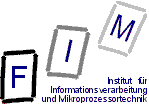
 |
Spezielle Kapitel aus
Informatik:
|
| Semester: | WS 2008/09 |
|
LVA - Name: |
Spezielle Kapitel aus Informatik: Adaptive Hypermedia Systems |
|
LVA - Nummer: |
353.046 |
|
LVA - Typ: |
KV |
|
Wochenstunden pro Sem.: |
2 |
|
Vortragende(r): |
Msc. Alexandros Paramythis |
| Max. Teilnehmerzahl: (Maximum participants) |
35 |
|
Anmeldemodus: |
Online-Anmeldung |
|
Block (The dates and times of lectures will be decided once the course starts)
Next date: |
|
|
Inhalt der LVA: |
The course will cover a wide range of issues related to adaptive hypermedia, and will include a lot of examples from existing systems, as well as hands-on experience with an adaptation engine (which will also be used in the course's project). Below you can find an overview of the course topics, as well as a description of the course project. During the course we will have a gues lecture of a leading figure in the field of Adaptive Hypermedia Systems, Prof. Dr. Paul M. E. De Bra of the Technical University of Eindhoven (TU/e). Prof. De Bra's group has developed the well-known AHA! open source adaptive hypermedia framework. This course will be taught in parallel with an equivalent course taught by Prof. De Bra in the TU/e. This means that the teaching materials used in both courses will be the same, and the students of the two courses will have an opportunity to collaborate on the courses' joint project.
The course project will involve the development of an adaptive web site using the AHA! system and its associatd authoring tools. The project will be carried out in groups, and people will have the opportunity to collaborate with fellow-students of the Technical University of Eindhoven, who will be attending the "parallel" course (see above for additional details). The project is intended to let students gain hands-on experience with
the course themes, and is mandatory. Additional information will be provided
during the course. |
|
LVA - Modus: |
The lectures will be
held in English! Die Lehrveranstaltung wird in englischer Sprache abgehalten! |
|
Prüfung: |
The course will have a final exam. Final marks will be derived proportionally from exam marks and from project marks. |
|
Literatur: |
All required literature, as well as course slides and accompanying materials, will be made available on the course's web site and will be available to course participants. |
|
|
Further information about the course will be available on the course's web site. If you need additional details to decide whether you wish to register for the course, please communicate directly with the lecturer (see "Further inquiries" below). |
|
Weitere Auskünfte: |
Alexandros Paramythis |
|
Links zu anderen Semestern: |
This course is taught for the first time in WS2008/09. |